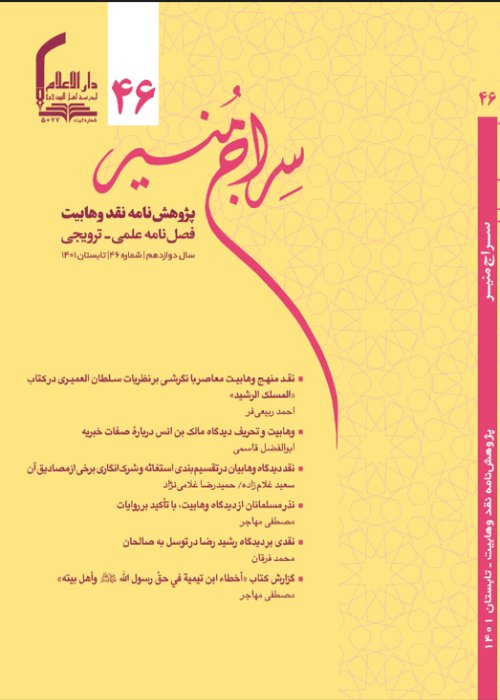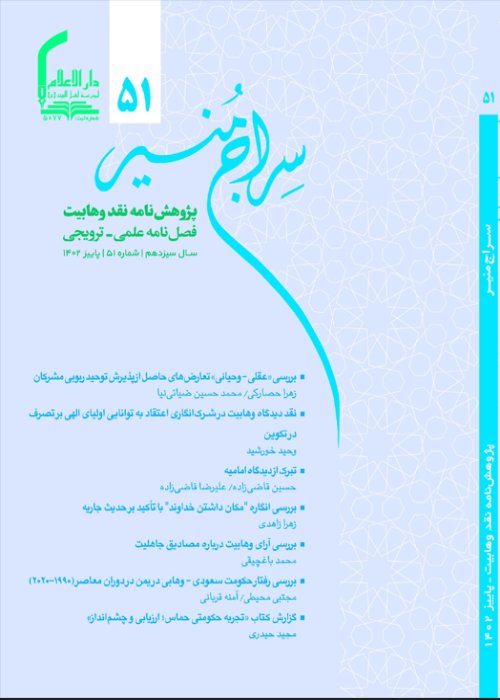فهرست مطالب

نشریه سراج منیر
سال دوازدهم شماره 46 (تابستان 1401)
- تاریخ انتشار: 1402/05/10
- تعداد عناوین: 6
-
صفحات 9-37سلطان العمیری به عنوان یکی از نظریه پردازان برجسته وهابیت معاصر، در ابتدای کتاب المسلک الرشید إلی شرح کتاب التوحید تلاش کرده پوششی نووهابی و فریب کارانه را بر اندام آیین و منهج وهابیت بنشاند، تا از این طریق، خلاءهای موجود در منهج وهابیت را جبران سازد، لکن توجیهات العمیری در عمل به مجموعه ای از مطالب و مسایل متناقض مبدل شده است. تناقض در بیان توحید ربوبی، تناقض در تعریف عبادت، تعریف اشتباه از مفهوم عبادت و انحراف در بیان خصایص الهی، برخی از اشکالات وارده بر این بخش از کتاب المسلک الرشید است که در این مقاله شرح داده شده است.کلیدواژگان: وهابیت معاصر، سلطان العمیری، نقد کتاب المنتقی من مسلک الرشید، تناقضات وهابیت
-
صفحات 39-53موضوع صفات خبریه و روش صحیح تفسیر آن، از مسایل پرمناقشه در تاریخ مذاهب اسلامی است. برخی از مذاهب منحصرا راه تفویض تمام معنا یا تاویل را تجویز کرده اند و برخی دو راه تفویض و تاویل را توصیه کرده اند. جریان وهابیت از بدو پیدایش تا کنون مکررا مذاهب اسلامی را به دلیل تجویز هر یک از راه های تاویل و تفویض به انحراف در فهم و تفسیر این دسته از صفات متهم کرده است و روشی نو در تفسیر این صفات ابداع کرده است. وهابیان با هدف تاصیل و هویت بخشی به ایده و روش خود تلاش کرده اند که سلف و عالمان مبرز متقدم اهل سنت را هم نظر و هم سنگ با خود معرفی کنند. عبارت «الاستواء معلوم، والکیف مجهول» که به مالک بن انس منسوب است، یکی از محوری ترین دلایل و سخنان مصادره شده از سوی وهابیان برای اصالت بخشیدن به این دیدگاه است. این مقاله پس از بررسی صحت و سقم ادعای وهابیان در انتساب عبارت مذکور به مالک بن انس، به این نتیجه رسیده است که اولا، عبارت «الاستواء معلوم، والکیف مجهول» از مالک بن انس نیست و ثانیا، اگر دیدگاه مالک بن انس در غیر صفت «استواء» بررسی شود، مشخص خواهد شد که دیدگاه او با وهابیت در تعارض است.کلیدواژگان: صفات خبری، وهابیت، مالک بن انس، تشبیه، الاستواء معلوم و الکیف مجهول
-
صفحات 55-72
وهابیان با تقسیم بندی استغاثه به اموری که مقدور بشر است و اموری که تنها از خداوند برمی آید سپس تفسیر ویژه و منحصر به فردی که از این دو مفهوم دارند، پیوسته تلاش کرده اند استمداد از پیامبر6 و دیگر بزرگان دین را، کاری مشرکانه قلمداد کنند. آنچه وهابیان را به این گمراهی کشانده چند موضوع مختلف است: 1) بی توجهی به عنصر نیت و اعتقاد درخواست کننده کمک. 2) تفسیر ناصواب وهابیان از مفهوم «ما لا یقدر علیه الا الله». تفسیری که وهابیان از مفهوم «ما لا یقدر علیه الا الله» دارند با چند اشکال روبروست:این تفسیر نه تنها در کتاب، سنت و سلف ریشه ای ندارد بلکه با آنها در تضاد است. علاوه براین برخی از باورها و رفتارهای رایج در میان سلف نیز ذیل عنوان مذموم «ما لا یقدر علیه الا الله» قرار می گیرد.
کلیدواژگان: استغاثه، ما لا یقدر علیه الا الله، شرک، دعا. -
صفحات 73-92وهابیت با نگاهی افراطی، مسلمانان را به دلیل نذرهایی که انجام می دهند، مورد هجمه قرار داده اند. آنها در این خصوص به چند روایت تمسک کرده اند. نگارنده در این تحقیق کوشیده است تا اولا، روایات مورد استدلال وهابیت را مورد نقد دلالتی قرار دهد؛ چراکه دلالت هیچ یک از آنها نمی تواند عدم جواز چنین نذرهایی را اثبات کند؛ ثانیا، با ذکر ادله قرآنی و روایی، فتوای فقهای مسلمانان و همچنین سیره مسلمین، جواز نذرهای مسلمانان را اثبات کند.کلیدواژگان: نذر، مذاهب اسلامی، وهابیت، روایات
-
صفحات 93-113توسل به صالحان یکی از مسایل ریشه دار اعتقادی در فرهنگ اسلامی است که ابن تیمیه و پیروان او در آن شک و تردید کرده اند. رشید رضا از جمله کسانی است که سخت روی این مسیله انتقاد داشته است و واسطه گری میان انسان و خالق را به هر نحوی که باشد، منافی توحید دانسته است؛ از این رو در تفسیر المنار بارها آن را رد کرده است. او برای اثبات دیدگاه خود به دلایلی مانند منافی بودن توسل با خلوص در عبادت، عنصر شرک در توسل و نفی استعداد وسیله بودن در انبیا و اولیا تمسک جسته است. مقاله حاضر با روش انتقادی و با تکیه بر آیات و روایات، به نقد محتوای استدلال های رشید رضا پرداخته است. نتیجه آن که برخلاف پندار وی، واسطه گری با خلوص در عبادت منافاتی ندارد؛ چون واسطه گری صالحان اصلا عبادت آنان نیست؛ عبادت، خضوع در برابر کسی است که پرستشگر، او را اله (مالک مدبر) بپندارد. قرآن کریم در آیات متعددی سلطه غیبی انسان های ویژه را فی الجمله ثابت می کند و اگر مقتضای روح ایمان، نفی مطلق سلطه های غیبی غیر خداوند باشد، بایستی وجود چنین آیاتی را مخالف روح ایمان قلمداد کرد.کلیدواژگان: رشید رضا، توسل به صالحان، واسطه گری، توحید و شرک، شفاعت، مفهوم عبادت
-
صفحات 115-125
کتاب عربی اخطاء ابن تیمیه فی حق رسول الله 0 واهل بیته نوشته دانشمند اهل سنت، دکتر محمود سید صبیح توسط دار زین العابدین بیروت به سال 1431ق (2010م) در 504 صفحه منتشر شده است. محتوای این کتاب در ارتباط با لغزش های ابن تیمیه در حق پیامبر $ و اهل بیت آن حضرت (است.کتاب یادشده تا کنون دو مرتبه به زبان فارسی ترجمه شده است، یکی با نام اشتباهات ابن تیمیه درباره رسول الله $ و اهل بیت ایشان با ترجمه «دکتر حسن حکیم» توسط انتشارات آثار نفیس شهر قم به سال 1394ش در دو مجلد منتشر شده است؛ دیگری هم باعنوان لغزش های ابن تیمیه در حق رسول خدا $ و اهل بیت در یک جلد است که با ترجمه «محمد تقدمی صابری» توسط انتشارات بنیاد پژوهش های اسلامی آستان قدس رضوی شهر مشهد در سال 1394ش منتشر شده است،کتاب مذکور متشکل از مقدمه، پیش درآمد، متن اصلی (دارای 96 عنوان از خطاهای ابن تیمیه به همراه نقد آن) و خاتمه می باشد.
-
Pages 9-37Sultan Al-Amiri, as one of the prominent theorists of contemporary Wahhabism, at the beginning of his book, "Al-Maslak al-Rashid", has tried to put a new cover of neo-Wahhabism to attract people on Wahabism. But practically, this attempt has failed, because there are so many deep contradictions between Wahhabi principles and the principles of Quran and Islam that turned this book to be contradictory mass, such as contradiction in Divine Monotheism, contradictions in the definition of worship, wrong interpretation from the concept of worship. These are the most important problems in the book, al-Maslak al-Rashid.Keywords: Contemporary Wahhabism, Sultan Al-Amiri, Criticism of the Book Al-Muntaghi Man Maslak al-Rashid, Contradictions of Wahhabism
-
Pages 39-53The issue of God's attributes and its correct interpretation is one of the topics that have been discussed a lot. The movement of Wahhabism accuses Islamic sects of deviating from true understanding of divine attributes. The Wahhabism as a deviant sect from has tried to impose their point of view to other Islamic sects. To do this, they have tried to ascribe their views to great Salaf scholars for bestowing legitimacy. one of these famous scholars is Malik Bin Anas, he has a famous quotation: "the God's sitting on the crown is known but its quality is unknown". The Wahhabi point of view on God's attributes agree with Anas, but care must be taken that according to the finding of this essay the views of Malik bin Anas in many cases conflict with the views of Wahhabists.Keywords: God's Attributes, Wahhabism, Malik bin Anas, similarity, God's Sitting on the Crown is Known but its Quality is Unknown
-
Pages 55-72
The Wahhabists divided the appealing for intercession in two kinds: what can only God can do it, and what the humans can do, providing their own peculiar interpretation from the concept of intercession. They maintain that any kind of seeking help from the Holy prophet or religious leaders will lead to polytheism and Shirk. What has caused the Wahhabis to deviate from the true path is the following: 1- they do not pay attention to the intention of doer of the actions. 2- some actions that the Wahhabi label as "only things that God can do it" is not true because this interpretation has no root in the Holy Quran, tradition of the Holy prophet or the disciples of the Holy prophet.
Keywords: Appealing for Help, What Can Only God Do It, shirk, Praying -
Pages 73-92With an extremist view, Wahhabists has attacked Muslims because of the vows they take. In this regard, they have relied on several narrations and Hadiths. In this research, the author has tried to firstly criticize the narratives argued by Wahhabists; Because the meaning of none of them can prove the impermissibility of such vows; Secondly, the author will mention some Quranic verses and narratives as evidence. furthermore, the finding of this essay shows that the fatwas of Muslim jurists and Muslim traditions will prove the permissibility of Muslim vows.Keywords: The Vow, Islamic sects, Wahhabism, Narrations
-
Pages 93-113Appealing to the righteous and saint guys is one of the deep-rooted issues of belief in Islamic culture, but Ibn Taymiyyah and his followers have doubted on it. Rashid Reza is one of those who criticized this issue, considering the mediation between man and the creator in any way to be contrary to monotheism. Therefore, he rejected appealing to saints many times in his famous book, Tafsir al-Manar. In order to prove his point of view, he mentioned the following: Supplication and appealing to the saints is against to purity in worshiping, monotheism and so on. The present essay with a critical method and relying on verses and traditions has criticized the content of Rashid Reza's arguments. The result is that, contrary to his idea, mediation does not conflict with purity in worshiping; because the intercession to the righteous is not their worshiping at all; because worship is submission to the one whom the worshiper considers to be God. The Holy Qur'an in several verses proves the occult dominion of special people. So, if we reject the supernatural power of Saints, we must also reject these Quranic verses as well.Keywords: Rashid Reza, Supplication to Saints, Mediation, Monotheism, Polytheism, the Concept of Worshipping
-
Pages 115-125
The book "Ibn Taymiyyah's Mistakes in the Rights of the Messenger of God (peace be upon him) and Ahl al-Baytah (peace be upon him)" by the Sunni scientist "Dr. Mahmoud Seyed Sabih", in connection with Ibn Taymiyyah's mistakes regarding the Prophet (peace be upon him) And the Ahl al-Bayt of that Prophet is written. The written language of this book is Arabic, which has been decorated in 504 pages by Zein al-Abidin publishing house in Beirut, in the year {1431 AH, 2010 AD}.This book has been translated twice into Persian language, one of which is called "The Mistakes of Ibn Taymiyyah about the Messenger of God (peace and blessings of God be upon him) and his family" in two volumes, by Dr. Hassan Hakim in 2014 by Nafis Publishing House of Qom. has been published, and the other is titled "Ibn Taymiyyah's slips about the Messenger of God, may God's prayers and peace be upon him, and the Ahl al-Bayt, peace be upon them" in one volume.
Keywords: Report, Ibn Taymiyyah, mistakes, prophet, Ahl al-Bayt


